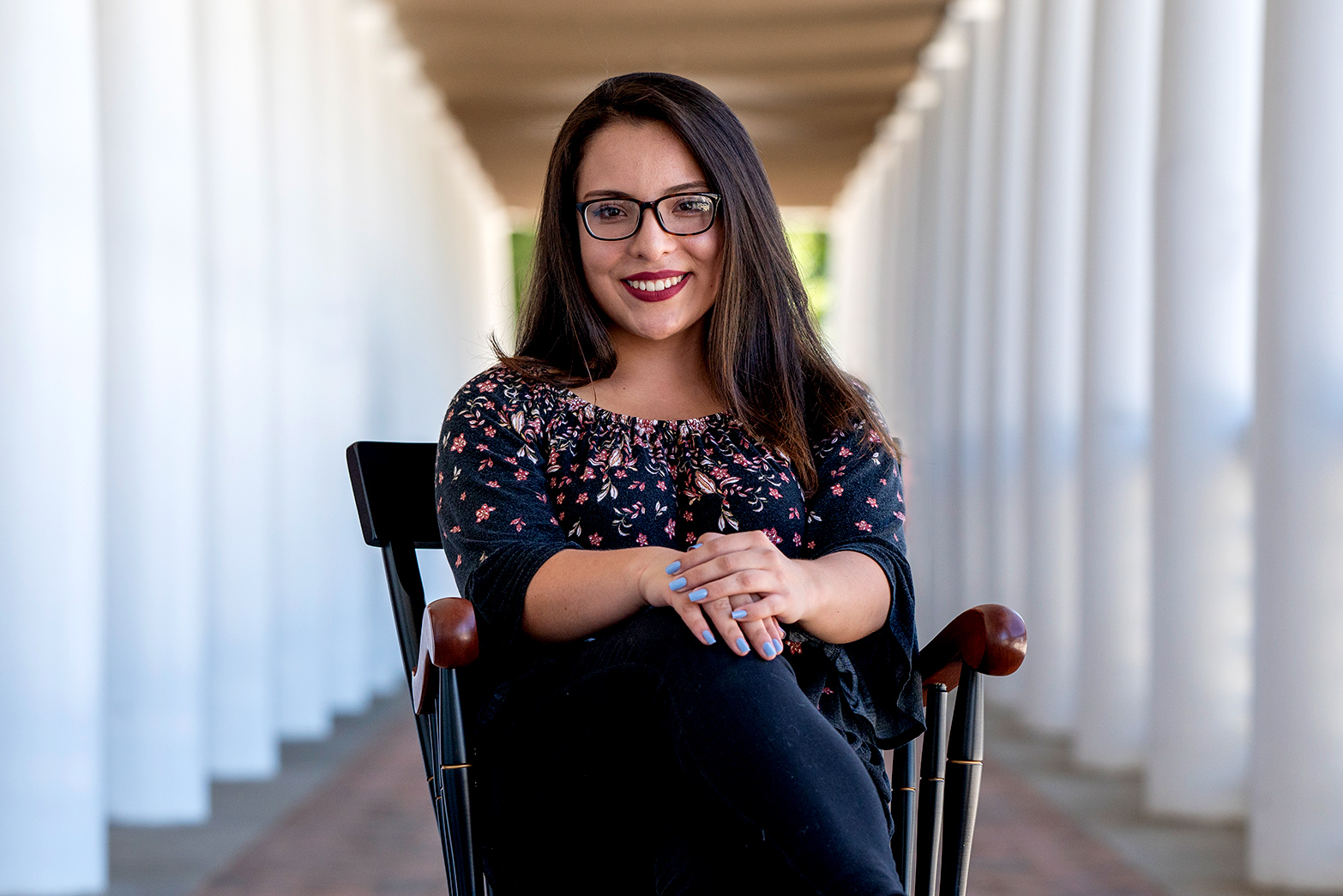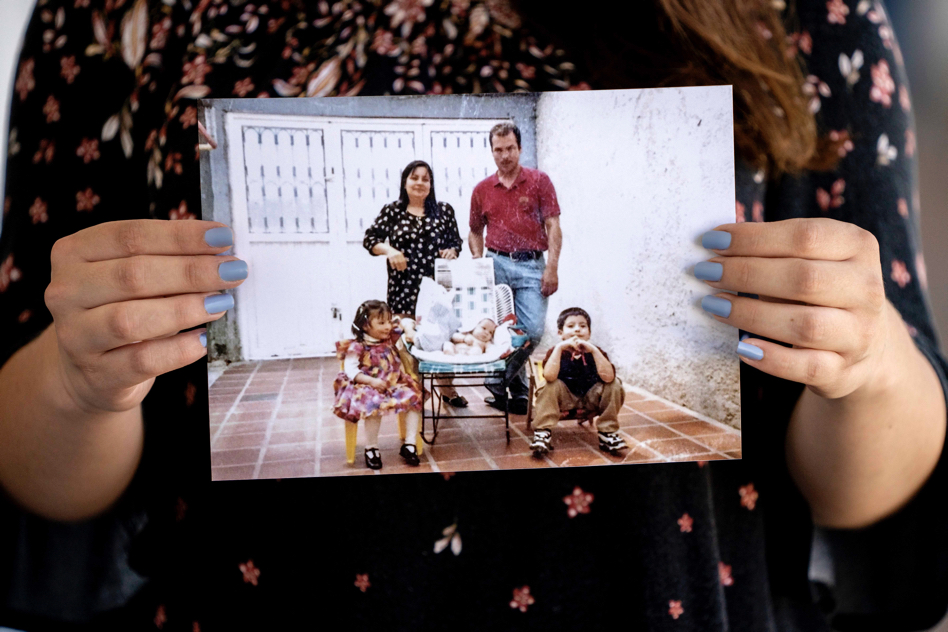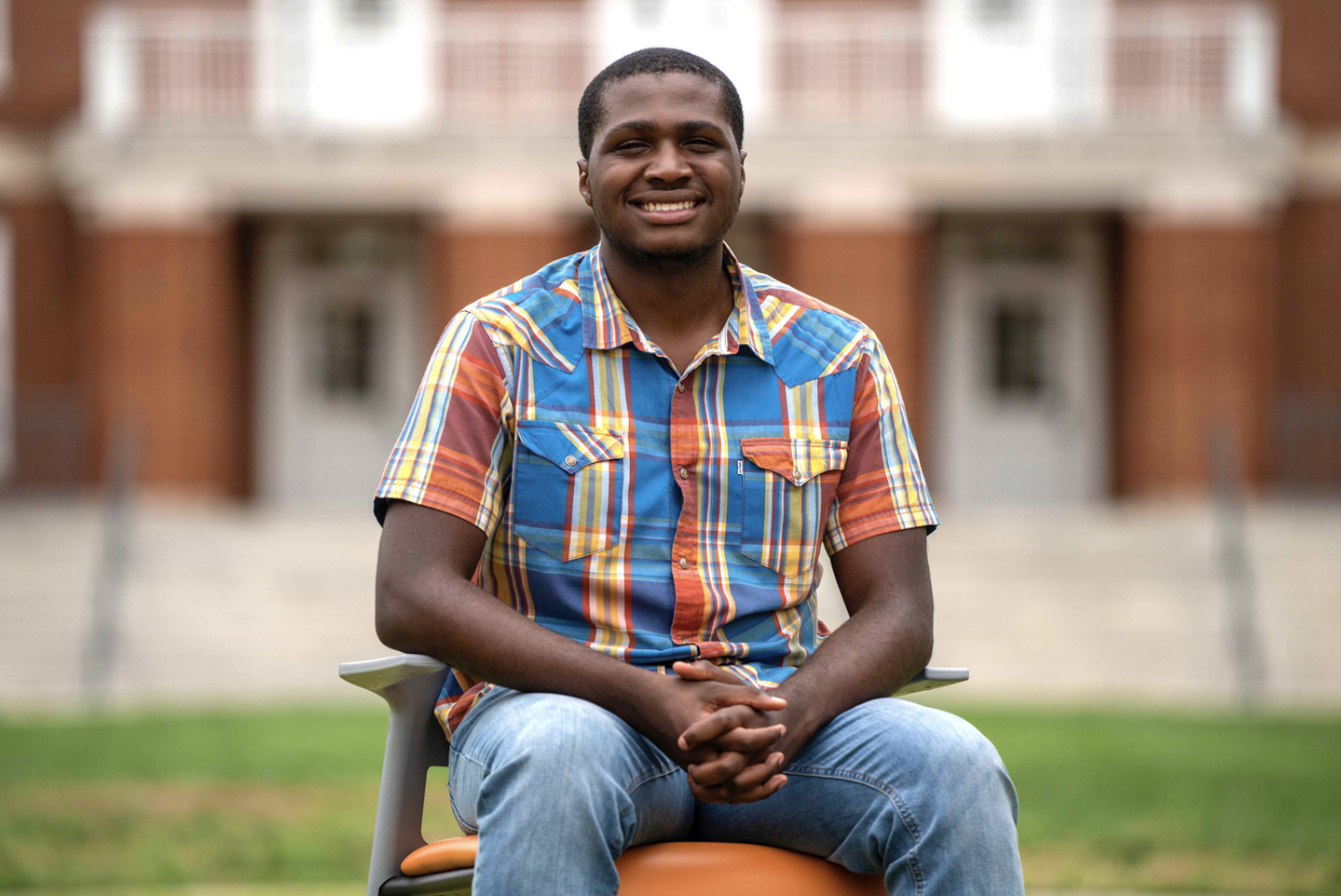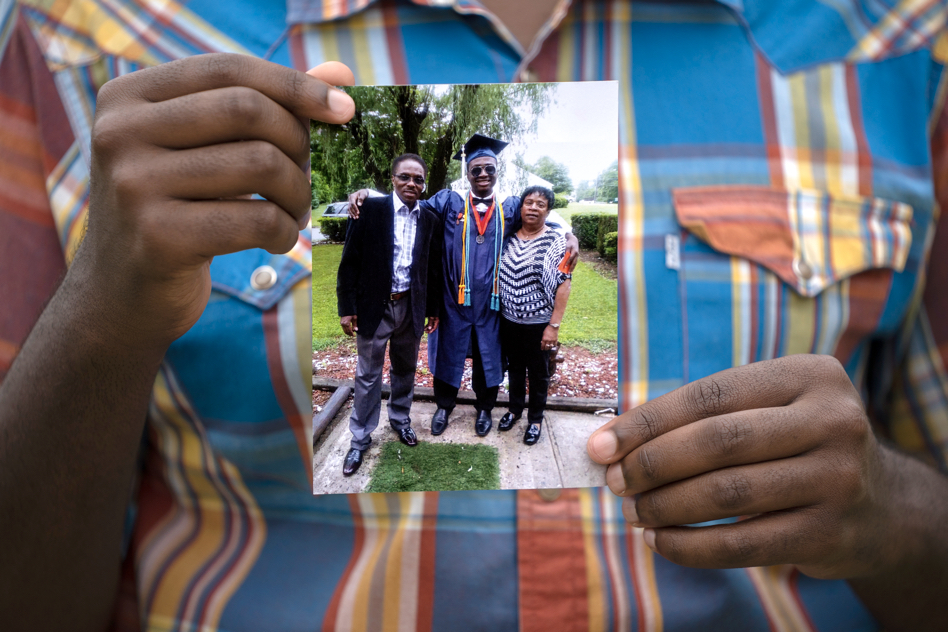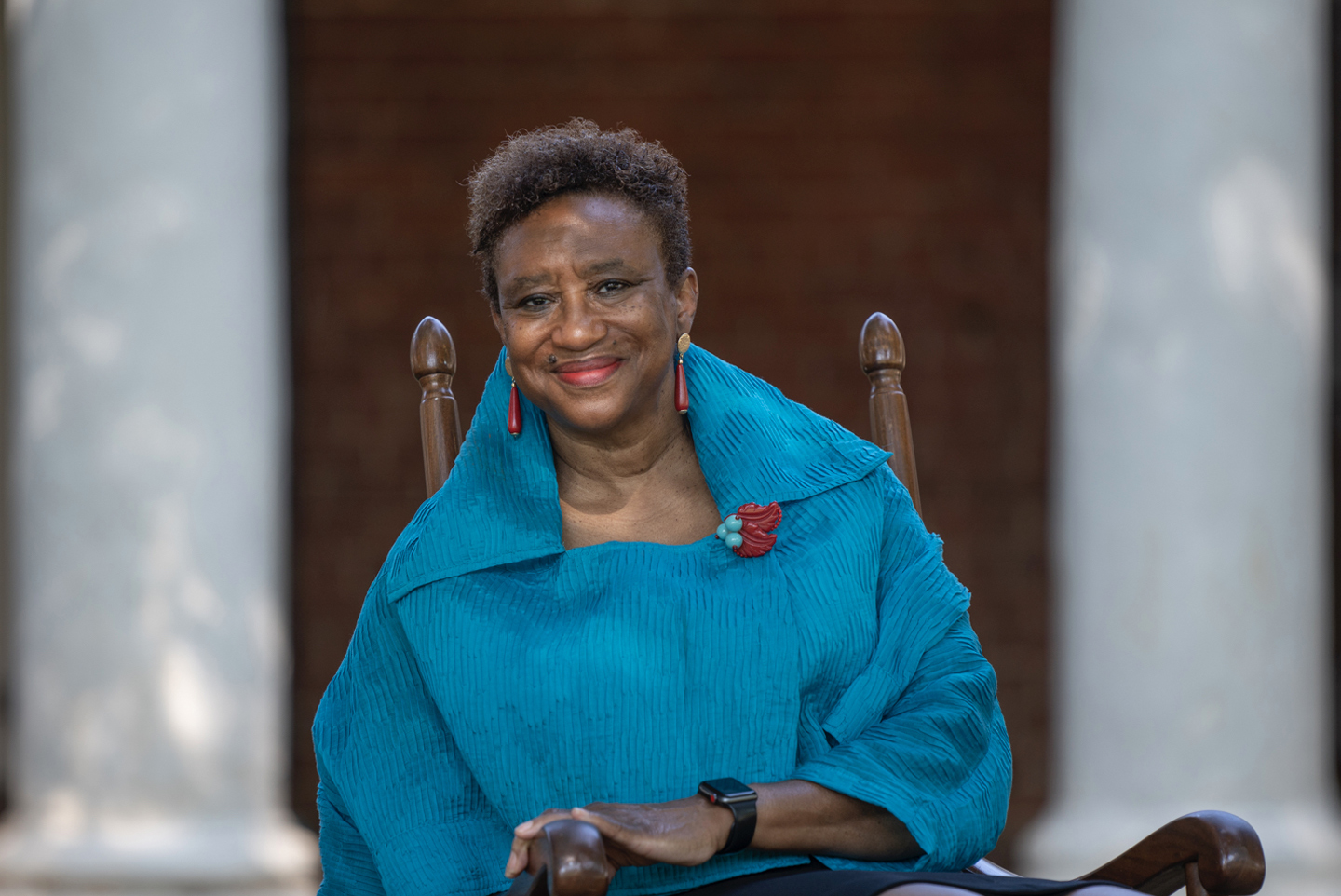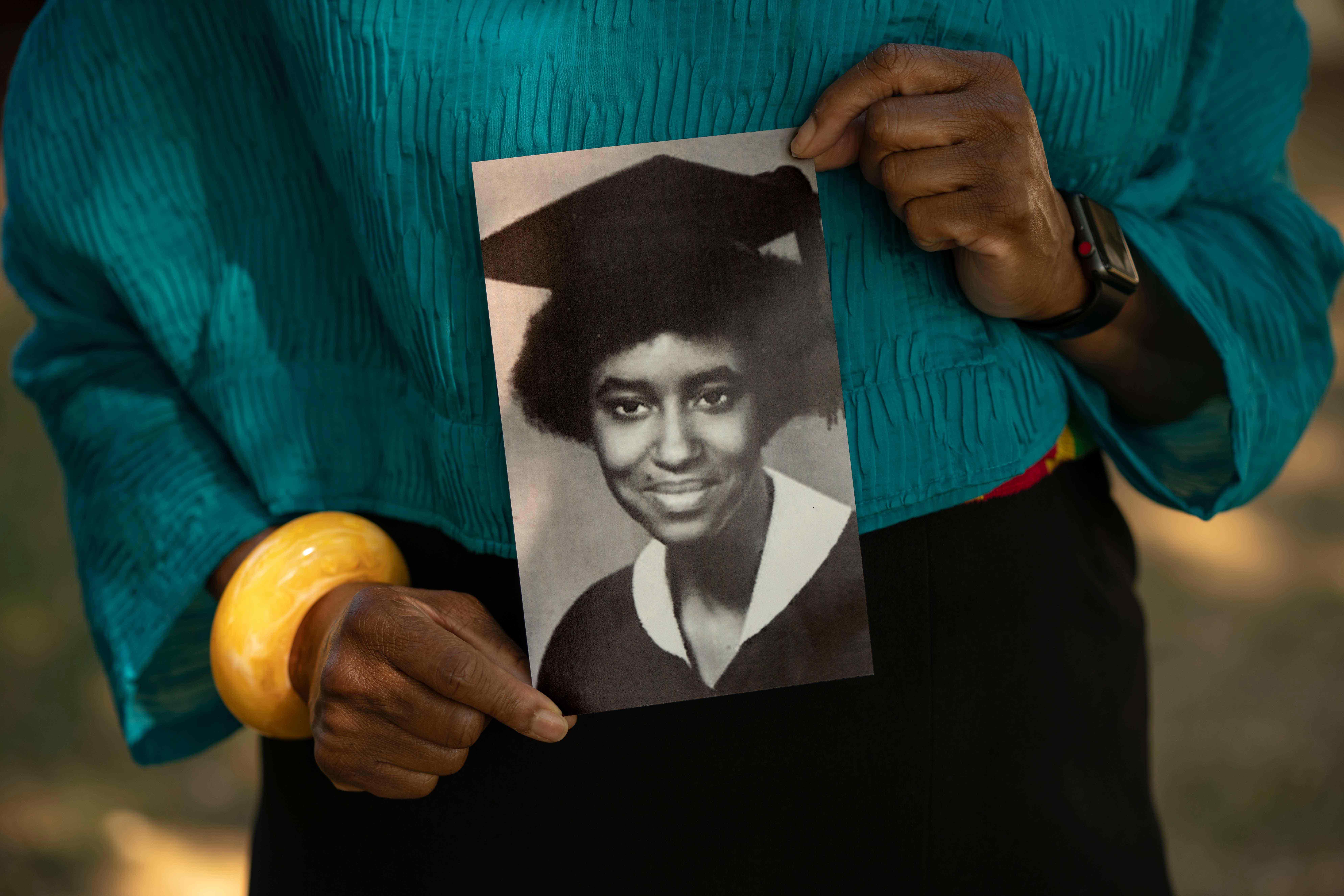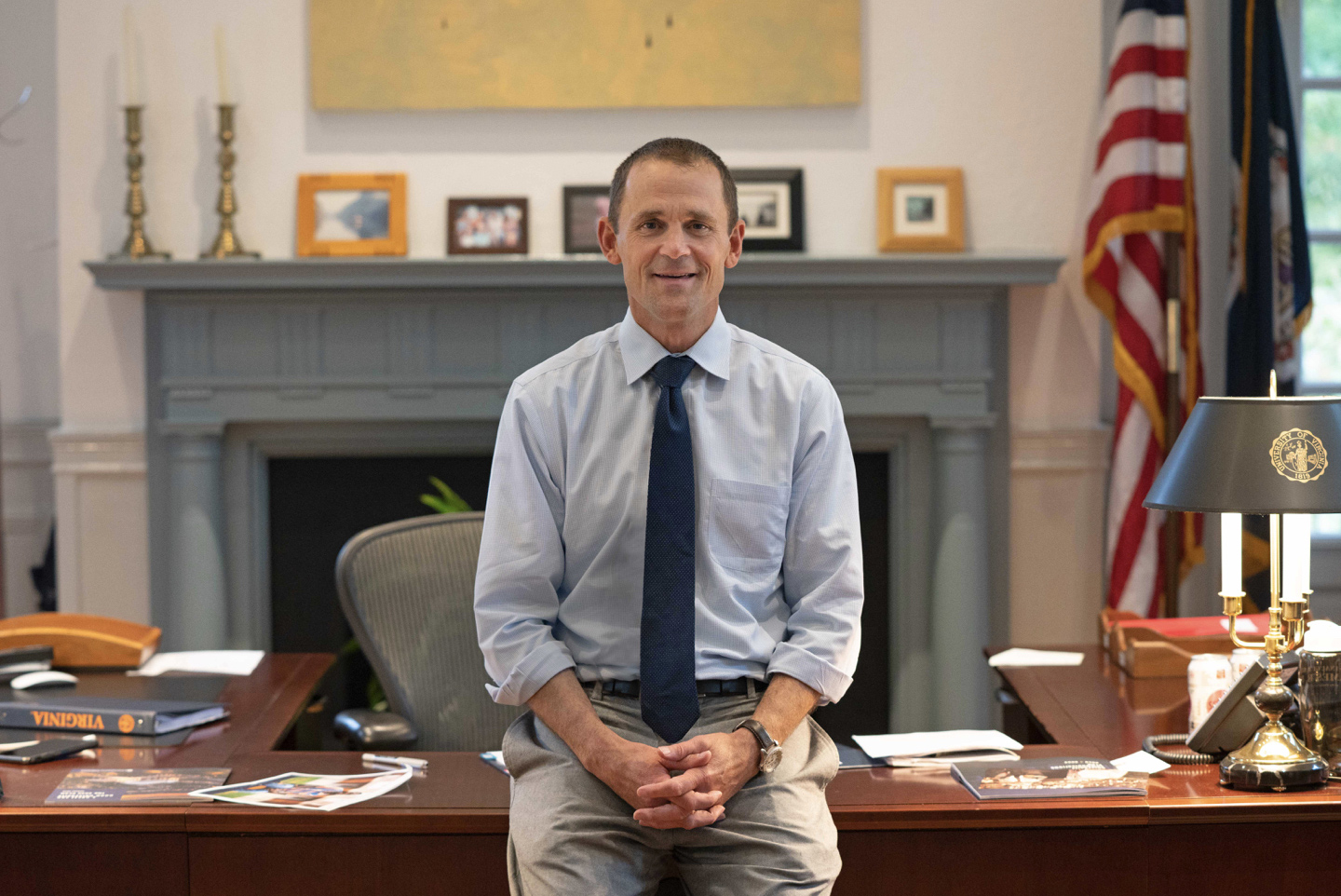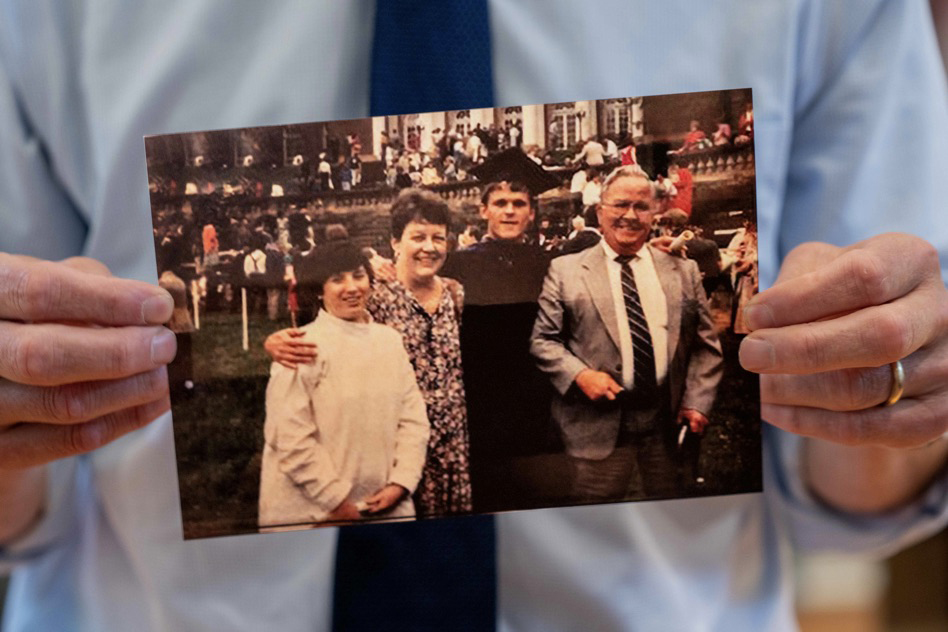Colombian Diana Albarracin adored her grandmother. She has vivid memories of visiting her on her farm in Caqueza, a few hours from Bogotá. Edilma Dussan grew onions and tomatoes and raised chickens and cows, using the milk to make cheese.
Nearly
19%
increase of first-generation students over last year
“My grandmother was like a mother to me,” said Albarracin, a second-year student at the University of Virginia.
Albarracin’s father worked as a mechanic, and her mother held a string of different jobs to help support the family. All the while, the parents knew that if they moved to the United States, their children could have a chance at a better life.
“All my siblings and I would have more opportunities here to get a higher education and to get jobs,” Albarracin said this summer in Charlottesville.
The family made that fateful move six years ago. Today, Albarracin, a first-generation student, is majoring in biomedical engineering at UVA.
She is one of a growing number of first-generation students at UVA. They make up nearly 13% of the Class of 2023, an increase of about 19% over last year. UVA President Jim Ryan, himself a first-generation college graduate, is working to make UVA a top destination for first-generation students.
On Saturday night, the University announced a $100 million gift from David and Jane Walentas that will establish a new scholarship program for first-generation students. David Walentas, one of the nation’s most successful self-made entrepreneurs, is a UVA alumnus and was a first-generation college student.
Here, we introduce you to four members of the UVA community who are also the first in their families to attend college – Albarracin and fellow student Rasheed Christian, English professor Deborah McDowell and Ryan – as well as to UVA Darden School of Business Sean Martin, whose research suggests first-generation students, in addition to their individual academic talents and interests, bring several uniquely valuable traits to the classroom and the workplace.
- 01
Diana Albarracin - 02
Rasheed Christian - 03
Deborah McDowell - 04
Jim Ryan
Diana Albarracin A Legacy, Paid Forward
Albarracin said the road to Grounds has not always been easy. Her family immigrated to Queens, New York, in 2013. She was in the 8th grade, her sister Lucy in the 10th; her brother Leonardo had already graduated high school. Both of her siblings struggled to learn English. Her brother dropped out of community college when it became too difficult to balance with a job.
Meanwhile, in her middle school, Albarracin was able to take classes in Spanish. That made all the difference for the bright student.
As a high schooler at the International High School at LaGuardia Community College, Albarracin pored over scholarship opportunities with her college counselor and homed in on Questbridge, a national nonprofit that connects high-achieving, low-income students to universities around the country. She qualified for a scholarship from the program and was matched with UVA.
Albarracin said the application process was overwhelming and she was worried she would make a mistake. “It was hard, but I always thought about my siblings and how fortunate and privileged I was.”
Move-in day for Albarracin was very different from that of most of her UVA peers. Her parents had to drop her off at her single dorm room in Weeden House and head back to Queens because her father had to work. Albarracin set up her dorm room herself.
“My parents kind of felt bad because … a lot of parents were helping their kids bring in stuff,” Albarracin said. “I remember my dad was like, ‘Oh my God, I should have gotten you a rug!’” But it was not a moment of sadness or shame for the new student. “I was like, ‘Oh no, it’s fine. It’s whatever. It’s my dorm. It doesn’t matter.’”
Her first year, Albarracin connected with her fellow Questbridge Scholars, many of whom, like her, are first-generation students. “We could relate and I wouldn’t feel dumb,” she said, especially when it came to knowing “how college works.”
Albarracin said Valerie Gregory, associate dean of undergraduate admission, was a huge help. “She is amazing,” she said. Gregory helped create events so Questbridge Scholars could connect. “Any of us, if we ever have a problem or anything, we can just go to her office,” she said.
502
first-generation students in UVA’s newest class
Early in her second semester, Albarracin got devastating news. Her beloved grandmother had passed away in Colombia, the victim of a car accident. Dussan was just 71 years old and still in the prime of her life, farming and contributing to her community in Bogotá.
It was too expensive for Albarracin to travel to Colombia for the funeral. Stuck in Charlottesville, she took some time to grieve, holing up in her room and missing several classes. At one particularly low point, she even thought about withdrawing from UVA. But she decided against that and dug in.
“The work kicked my butt,” she said. For the rest of the semester, she said she felt like she was just trying to catch up with her classmates. “People kept learning more and I was, like, ‘No, wait for me.’”
Her grandmother’s legacy is what kept her going. “I learned so much from her. She was a leader in her community and she worked extremely hard every day to have enough to survive. She was everything I hope to become and I want her legacy to continue.”
A Trend Toward Resilience
Albarracin’s resilience is not surprising to Sean Martin, a Darden School of Business professor who has closely studied what he has termed “social class transitioners,” people who move from one class to the next.
According to data from Opportunity Insights, 52% of low-income students who attended UVA in the early 2000s, many of them first generation, moved to the top 20% of income levels after graduation.
Martin has found that social class transitioners learn to better relate to others from all walks of life – one reason first-generation students can make such a big impact on Grounds.
“There is a hardcore, quantitatively measurable difference,” he said. “People from different social classes have different experiences. Without bringing more people who are first generation into our university, we are missing some very valuable people who have developed different insights on how to solve problems, how to relate to other people, because they have grown up in different kinds of communities.”
Martin said a lot of research, including his own, shows that people who come from lower social class backgrounds tend to prioritize community and interdependence over independence and self-focus. Often, he said, they had to learn that social currency is more important than actual financial currency.
“You can’t afford to have a job if you don’t have a good relationship with your neighbor, who can watch your kid, or with a friend of yours who lives down the street who can give you a ride when your car breaks down,” he said. “If you don’t have those social connections, a job is irrelevant because you can’t get to it anyway.”
In higher socioeconomic backgrounds, these issues are not as great of a concern. Martin said if you have children, you can hire a babysitter or a nanny or put them in daycare. If your car breaks down, you can get a loaner or rent another car. You can call an Uber.
Because of this, Martin said, people from lower socioeconomic backgrounds tend to pay more attention to people in their immediate vicinity and have higher “empathic accuracy or, more colloquially, more emotional intelligence.
“They are more likely to think about how their actions affect the broader community,” he said.
Interestingly, Martin said people with lower incomes tend to play group sports because you can share resources. “If one kid has a basketball and your neighborhood has a court, you can all play,” he said. “Whereas kids from high social class backgrounds tend to play things like tennis or golf or things that are much more independently focused. They have individual coaches and tutors, all these things that signal to them: ‘You are very special. You are very important. You, as an individual, are all you have to worry about and the team is less of a thing.’”
Martin said people in lower income brackets do not get the same message and it sometimes leads the two groups to act in different ways. “Again, I’m not making a value judgement. It just means there’s a huge swath of ways to relating to people that aren’t represented as much without first-generation students,” he said.
In fact, because of the interdependent tendencies of first-generation students, Martin said, those people are really “the glue” of an organization or a community, “because they are the people who recognize discord and who will take steps to form those good relationships.
“These are people who can, if given the opportunity to rise up in the social class, have the experience where they came from, learn the culture of where they are now, and help people who are just like them, who might feel left out, to relate and integrate better into this new environment,” Martin concluded.
That last point is also borne out in Diana Albarracin’s experience at UVA. Late in her second semester, she was asked to mentor an incoming Questbridge Scholar who is also a first-generation student. Albarracin said this immediately made her feel better because she knew she could help him. “I actually felt like, ‘Yeah, I know how to answer his questions and I always try to relate,” she said. She thinks it’s helpful when people from similar backgrounds can help one another.
“It’s very empowering.”
- 01
Diana Albarracin - 02
Rasheed Christian - 03
Deborah McDowell - 04
Jim Ryan
Rasheed Christian “I Know Things Now”
Albarracin’s classmate, Lynchburg native Rasheed Christian, was in the 10th grade when he first visited UVA. He was a member of Lynchburg Beacon of Hope, a community program that aims to show all Lynchburg students that higher education can be a reality for them.
Christian, who was raised by his grandparents, had never considered college before. But that first fall visit to Grounds changed everything for him. It was a rainy day and he said the poor weather was actually a good thing. It forced his student tour guide to bring Christian’s group inside several buildings. “I got to see some of the interiors of the buildings and I was like, ‘Wow, this is like something you would see in a movie,” he said, particularly impressed by the McGregor Room, a study space in Alderman Library nicknamed the Harry Potter Room. “I was just blown away.
Nearly
2.1k
first-generation students enrolled for the current academic year
“Once my college search began, I couldn’t stop thinking about UVA,” he said. Lynchburg Beacon of Hope helped him with his college applications and Christian got into his dream school, earning a University Achievement Award that covers full tuition and fees for exceptional Virginia students who are first-generation and bring diversity to the student population.
A week after he was notified that he’d been awarded the scholarship, he and the other award winners were invited back to UVA for a luncheon where they all met and mingled with University Achievement Award winners from upper classes.
“I felt like I was at a disadvantage coming into UVA, being first-gen,” he said. “But it showed me that there are other people who were in this situation and that they did it, so I’m able to do it. It was the motivation I needed.”
Christian moved into Balz-Dobie House in 2018. “My first year, there was a lot of adjustment because I came in and it was a completely new world to me,” he said. “I feel like if I had the knowledge I had at the end of my second semester, then my first semester would have gone a lot better.
“I always heard that college was all about time management, but hearing about it and doing it are two very different things,” he said. An Echols Scholar, he had to refine his study habits and, as he put it, “make UVA my own place.”
His favorite study spot is in Clemons Library in the technology lab. “They have these big Mac desktop computers and nobody goes in there. It’s just a quiet space,” he said. “It’s just the perfect place to work.”
Christian said he has leaned on the staff in the Office of African-American Affairs. “They helped a lot and pointed me in the right direction for resources,” he said. “It’s crazy how many resources are available at UVA, but I just didn’t know half of them.”
Here again, longtime dean of undergraduate admission Valerie Gregory’s name surfaces. Christian went to her after attending the fall Student Activities Fair, where dozens of clubs invite students to join. “I was just overwhelmed by that,” he said. “I wanted to get organized and she helped point me in the right direction,” he said. “She told me about U.P.C.,” the University Programs Council, a student group that helps provide entertaining and educational activities and events. “I’m in U.P.C. and I absolutely love it.”
With a year behind him, Christian is ready to give back, as so many first-generation students want to do. “One big thing about being at UVA is just knowing your way around. I mean, it took me a hot minute to figure out,” he said. “Just knowing that is going to help me help other people a lot.”
Last semester, he loved being able to point prospective students in the right direction, be it the Aquatic & Fitness Center or a particular dormitory. “It just showed me that I’m part of the UVA community. I know things now.”
Christian is also a University Achievement Award mentor now. “I’m going to have new mentees to help out when they come to UVA,” he said.
- 01
Diana Albarracin - 02
Rasheed Christian - 03
Deborah McDowell - 04
Jim Ryan
Deborah McDowell The Great Adventure
A former first-generation student is now in the highest ranks of faculty at UVA; Deborah McDowell is the Alice Griffin Professor of English and chair of the Carter G. Woodson Institute for African-American and African Studies.
It was 1968 when she enrolled as a freshman at Tuskegee Institute in Alabama. “Alabama is my home state. Like many working-class students in the area … we went to area schools. Applying to college was so much less scientific,” she said. “We definitely had a conversation with the guidance counselor, who had a few books in her office and that was that. So, I appeared at Tuskegee Institute in the fall of 1968, sight unseen.”
McDowell said the combination of being the first in her family to attend college and going somewhere she’d never visited before was not, to her, a double whammy. “It seemed, primarily, an enormous opportunity,” she recalled. “My grandparents, uncles, aunts and teachers in the segregated public schools of Alabama really prized education above everything,” she said. Getting to go to college with some financial assistance was a dream come true to McDowell.
Nearly
13%
of UVA’s Class of 2023 is made up of first-generation students
“Along the way, there were challenges that I think even contemporary first-generation students face, largely financial,” she said.
McDowell worked throughout her time as a college student. One of those jobs was as a tutor. Funnily enough, one of McDowell’s students was singer Lionel Richie, who was just beginning to form his band, The Commodores. “That was long before he was famous and I doubt he would know me from Adam’s house cat,” she chuckled.
McDowell said it didn’t matter that, as a girl, she didn’t have a household example of a college graduate. “What happened to me is what happened to a number of people of my generation and in my class as we were brought up in the church,” she said. That meant that she was among parishioners who were teachers and principals. “We were surrounded by people who had gone to college,” she said, most of the ministers were seminary-trained as well. So for McDowell, the idea of going to college was not a foreign concept.
“If you get into the history of the black church, you can readily see placing those roots in the emphasis on education,” she said. “That was the environment in which I was nurtured.”
Her advice to today’s first-generation students at UVA is to avail themselves of the resources at the University, such as the many first-generation student groups and administrative support programs in the Office of the Dean of Students.
She said they should also focus on why they are here, which is to be educated and to bring the richness of their own experiences, both personally and educationally, to the University. “I would also say, ‘Have fun.’ College is a great adventure. Give yourself over to that adventure.”
McDowell said first-generation students, who are mostly low-income students, are also good for the University because “they are bringing necessary balance to the overwhelming majority of our students whose class positions are high and therefore have little understanding or appreciation of inequality, intergenerational wealth disparities, of disparities in practically every measure of human existence.
“They bring to this environment experiences that challenge us, to expose our students in the classroom and beyond, to these disparities.” she said.
Jim Ryan Like Visiting a Foreign Country
UVA’s ninth president, Jim Ryan, is also a first-generation student. He grew up the son of adoptive parents Jim and Sheila in Midland Park, a blue-collar town in Northern New Jersey.
In an odd twist, his hometown did not have enough students to support a high school, so students from a nearby, affluent suburb – Ho-Ho-Kus – were bussed to Midland Park High School.
“The question that kids I grew up with would ask is whether they were going to go to college and the kids from Ho-Ho-Kus basically wondered where they were going to go to college,” he said.
Ryan said it made a difference going to school with people whose parents had gone to college and that conversations about applying to college were part of the fabric of his high school experience. “That certainly helped my own thinking about it, but I sort of had my sights set on college from the time I was in high school,” he said.
His parents talked a lot about college, too. “My dad barely made it out of high school and appreciated what he missed, and my mom finished first or second in her high school class and had a partial scholarship to college. But her parents were not convinced that young women needed to go to college, and they could not afford it any event,” he said. “I think she always regretted, just a bit, not having the opportunity to attend college.”
His junior year at Midland Park High, Ryan went to talk with his guidance counselor about applying to schools. He was an excellent student and has done well on his SAT. “She said, ‘You know, if you keep this up you should really consider applying to Rutgers,” Ryan recalled. “And that was it.”
Ryan’s father was puzzled. Rutgers is a great school, and he was sure his son would get a good education there. But he wondered why he shouldn’t apply to other places as well. “My father said, ‘You know, I don’t know anything about this, but who’s doing better than you do? Why can’t you apply anywhere you want to apply?’” Ryan said. “And I said, ‘I don’t know.’ And he said, ‘Well let’s go talk to Mr. Adee.’”
Adee was the father of one of Ryan’s Ho-Ho-Kus classmates and had gone to Princeton. The elder Ryan thought Adee could tell his son where to apply to school.
“I remember going to their house and sitting in their living room,” Ryan said. “You know, the formal living room that you never use, which made me a little uncomfortable. I brought all my academic and extracurricular information.”
After a review of the materials, Adee told Ryan he should apply anywhere he wanted and that he'd bet Ryan would get in everywhere he applied.
Ryan applied early to Princeton, but was deferred, so sent in applications to several other places, including Dartmouth and Yale. He fell in love with Dartmouth “in part because I had a totally fun visit,” he said. “And Dartmouth looked exactly like I thought a college should look.”
Ryan’s visit to Yale was a different story, or as he put it, “slightly a disaster.” He’d gone on the visit alone and stayed with his cousin, who was a student. Ryan’s car was towed twice in one day. “I had little money, so the second time it got towed, I went to pick it up and was told it would cost $65 or something like that,” to get it out, he said. Ryan only had $37 in his pocket. In a merciful act, the tow truck driver took the money and handed Ryan the car keys.
Driving home on Interstate 95, the penniless teen realized with some dread that there were several toll booths, with gates that would only open when you paid the toll, between there and home. Ryan had to tailgate behind other drivers to make it through the tolls. “When I got home I walked in the house and I told my parents, ‘Not only am I not going to Yale, I’m never going to Connecticut again.’”
Ryan, in fact, did go to Yale. His English teacher’s advice was the deciding factor. She said if he went to Dartmouth, Ryan would love it and have friends a lot like him. If, however, he went to Yale, he would meet people whom he would never otherwise meet, Ryan recalled. He waited until the very last day to decide that he would enroll at Yale at age 17 with a healthy financial aid package. Four years later, in 1988, he graduated summa cum laude with a bachelor’s degree in American studies.
Ryan’s experience at Yale as a first-generation student mirrors the stories above. He felt like he didn’t know his way around and others seemed more “clued in” than he was. “Some students, you know, seemed to know an awful lot about Yale’s traditions. They knew the words to the Yale songs,” he said. “And so, I just felt like I had missed some course or something that was supposed to clue me in to some of the less visible parts of the culture.”
But Ryan also chalked up his early unease to the normal jitters that come with living away from home for the first time. “I eventually made friends who have lasted a lifetime. It wasn’t like I felt totally out of place,” he said. “It was more like visiting a foreign country, and there were some people who seemed clearly to have been to that country before.”
During his time as an undergraduate student, Ryan said he really wasn’t focusing on the fact that he was a first-generation student. “First-gen was not a thing,” he said. “People would ask me if I was the first in my family to go to college, and I would say ‘no’ because my older sister had enrolled the year before. And that was the end of the conversation.”
First-generation students were not as visible as they are today. Ryan remembers issues facing first-generation students starting to be discussed about 15 years ago, when he was teaching at UVA’s School of Law. Why? “My guess is that it was probably a combination of students asking for a little bit more guidance and faculty and staff realizing that there were challenges common to students who were first-gen that they could address,” he said.
Today, as part of his strategic plan, Ryan is working to make UVA a top destination for first-generation students.
He said UVA should be looking for talent wherever it lies. In addition, he thinks that an important “part of our mission in terms of providing a service to the public is to be an engine for social and economic mobility,” he said. “Going to college is still one of the best tickets for social and economic mobility.
“I know from my own life that going to college doesn’t just affect you as an individual, it affects your entire family,” Ryan said. “It changes the path not just of your life but of your kids’ lives. So it’s just an incredibly powerful tool and one that makes a difference, not just in one life, but in lives to follow.”
Ryan said he thinks first-generation students have already proven themselves to be path-breakers but also deserve support, “as they’re going into unchartered territory, which is always harder than following a path that is familiar.”

